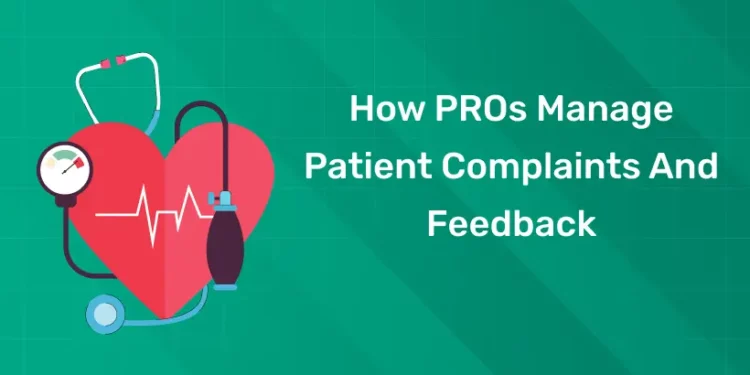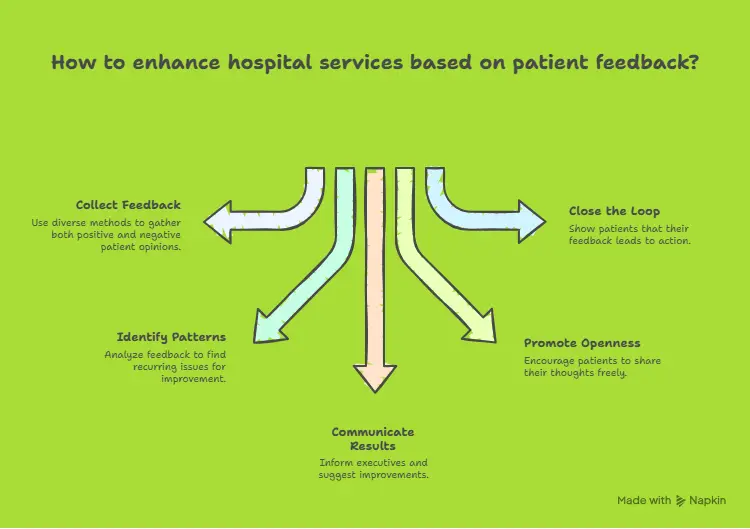Table of Contents
A hospital’s credibility and prosperity rest on the level of care its patients receive. Both good and negative comments and complaints provide light on the service’s quality, the efficiency of the personnel, and the satisfaction of the patients as a whole. When it comes to communicating between patients and hospital administration, public relations officers (PROs) are essential. Building trust, improving services, and maintaining a positive public image are all aided by PROs, who assist hospitals in doing so via efficient communication, systematic feedback collection, and timely problem response.
Explore Your Future in Hospital Administration! Enroll now
Understanding Patient Complaints in Hospitals
A useful technique for hospitals to uncover service gaps and areas that may need some improvement is via the use of complaints from patients. The following are some of the most common complaints:
- Long wait times, whether they be for an appointment or for treatment, are quite frustrating.
- Having difficulty communicating one’s thoughts to healthcare practitioners or office staff is sometimes referred to as disagreements.
- The following are some instances of billing and administrative issues: problems in insurance claims, charges that are unclear, or inaccurate invoices.
- Following the completion of medical treatment, patients may have emotions of being misunderstood or uncared for.
- Concerns relating to the institution, such as discomfort, infrastructure, or hygiene, among other things.
In order to get to the bottom of matters, it is necessary to comprehend complaints. The hospital has the opportunity to enhance the quality of care, the training of its personnel, and the connections it has with its patients with each and every complaint. When hospitals see complaints as chances for progress rather than problems in and of themselves, they may be able to cultivate a culture that is centered on the patient.
How PROs Handle Patient Complaints Effectively
1: What is the primary role of a hospital administrator?
In order to handle patient complaints in a manner that is both professional and compassionate, those who serve as public relations officers (PROs) have undergone significant training in the skill of doing so. Their objective is to resolve complaints while simultaneously preserving trust and a positive impression of the institution; this is their goal. A smart technique for handling complaints is to ensure that these steps are followed:
- PROs assist patients in experiencing a sense of being heard and appreciated by attentively listening to the concerns addressed by patients and refraining from interrupting them.
- Taking the time to meticulously record each and every aspect of the complaint is very necessary in order to ensure effective monitoring and follow-up. A patient’s perspective, the date, and the department that was involved are all included in this.
- The prompt investigation is carried out by the PROs in conjunction with the necessary administrative or medical teams in order to ascertain the origin of the issue and gather evidence.
- Providing Patients with Regular Updates. Patients are more likely to trust their healthcare provider and experience less frustration when they are provided with regular updates on the progress of their issue.
- Correcting the Problem: Professionals ensure that whatever the problem is that needs to be fixed gets fixed, whether it be improving communication, correcting invoicing difficulties, or fixing service delays.
- The PROs will get in touch with the patient once again to inquire about their level of contentment with the resolution of the patient’s concern.
PROs may assist in improving hospital services in the long term by identifying systemic issues that affect several patients and proposing solutions that combine empathy with a disciplined approach. This is in addition to resolving particular patient complaints, which is part of the PROs’ primary responsibility.
Hospital Administration Course with Assured Career Growth
Hospital Administration Course by Entri App: Master essential healthcare management skills, gain certification, and secure top roles in leading hospitals
Join Now!The Role of PROs in Collecting and Managing Feedback
The opinions of patients serve as a guide for healthcare providers to enhance their services. To better understand what is working and what needs improvement in hospitals, PROs serve as advisors. They are responsible for:
- In order to get feedback, PROs use various methods, including questionnaires, feedback forms, web portals, and even casual discussions. This allows them to record both positive and negative thoughts from patients.
- Pattern Recognition: In order to identify areas where the hospital may make improvements, they search for similar problems or recurring difficulties.
- Communicating results to hospital executives: PROs inform hospital executives of their results and provide realistic suggestions to improve service and care for patients.
- Promoting Open Communication: PROs foster an environment of trust and openness by urging patients to openly express their opinions.
- By relaying the steps taken in reaction to patients’ recommendations or grievances, PROs close the loop and show patients their opinions matter.
Best Practices for Effective Complaint and Feedback Management
By efficiently resolving complaints and criticism, hospitals have the ability to enhance their services, grow the confidence of their patients, and guarantee an amazing experience for their patients. This article presents a number of important processes, including:
- To improve the level of openness, it is necessary to provide a detailed explanation of the policies employed by the hospital as well as the procedures that are used to address complaints.
- Employees need to be taught so that they can handle the concerns of patients in a manner that is both sensitive and professional.
- Following up with patients once a resolution has been reached is very necessary in order to guarantee that they are pleased with the results.
- Through the establishment of protocols for the management of digital complaint and feedback forms, the use of technology may be maximized.
- It is crucial to encourage staff members to prioritize the needs of patients and to take their comments seriously to build a culture of care that is focused on the patient.
Explore Your Future in Hospital Administration! Enroll now
Conclusion
Trust, service improvement, and an improved patient experience may all result from well-managed patient complaints and feedback. It is crucial for PROs to listen, address problems, and transform input into changes that may be implemented. Hospitals may improve relationships, increase happiness, and keep a good image by listening to patients and creating an environment of openness and empathy.
Hospital Administration Course with Assured Career Growth
Hospital Administration Course by Entri App: Master essential healthcare management skills, gain certification, and secure top roles in leading hospitals
Join Now!Frequently Asked Questions
Why is patient feedback important for hospitals?
Patient feedback helps identify areas for improvement, enhance service quality, and increase patient satisfaction and trust.
What tools help in managing patient feedback?
Hospitals use surveys, digital feedback systems, and complaint-tracking software to collect and monitor patient opinions efficiently.
How do PROs handle patient complaints?
PROs listen carefully, document issues, coordinate with departments, and ensure quick, fair resolutions while keeping patients informed.
How do PROs ensure confidentiality during complaint handling?
PROs maintain strict privacy standards, ensuring all patient details and complaints remain confidential.
How does effective complaint handling benefit the hospital?
It increases patient trust, improves service quality, and strengthens the hospital’s overall image.












